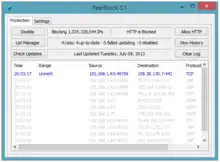PeerBlock
PeerBlock is a free and open-source personal firewall that blocks packets coming from, or going to, a maintained list of black listed hosts.[2] PeerBlock is the Windows successor to the software PeerGuardian (which is currently maintained only for Linux).[3] It blocks incoming and outgoing connections to IP addresses that are included on blacklists (made available on the Internet), and to addresses specified by the user.[3] PeerBlock mainly uses blacklists provided by iblocklist.com.[4]
 PeerBlock 1.1 on Windows 8.1 | |
| Developer(s) | Mark Bulas, "night_stalker_z", "XhmikosR" |
|---|---|
| Initial release | September 27, 2009 |
| Final release | 1.2[1]
/ January 14, 2014 |
| Repository | |
| Written in | C++ |
| Operating system | Microsoft Windows |
| Available in | English |
| Type | Firewall |
| License | GPL or zlib License |
| Website | peerblock |
| Part of a series on |
| File sharing |
|---|
 |
| File hosts |
| Video sharing sites |
| BitTorrent sites |
| Media servers |
| Technologies |
| File sharing networks |
| Academic |
| P2P clients |
| Anonymous file sharing |
| History and societal aspects |
| By country or region |
| Comparisons |
Development
PeerBlock 1.0 is based on the same code as PeerGuardian 2 RC1 Test3 Vista version.[3] It adds support for 32- and 64-bit Windows Vista, Windows 7, and Windows 8. When the PeerGuardian project ended, its developer Phoenix Labs encouraged current PeerGuardian users to migrate to PeerBlock.[5]
PeerBlock is under development by a small team of developers led by Mark Bulas.[6] Hosting, as well as the signed driver, is funded by donations from the public. Future donations are intended to contribute to future signed drivers, hosting and to possibly rent a virtual private server on which the team should be able to build a "real" online-update feature for future releases of PeerBlock.
Features
PeerBlock has added multiple features in the latest version of the program. Such as a constantly updating blocklist managed by the home site and a manager that lets you choose which lists to include in the block.[7] The program allows for a user to turn on and off both IP and HTTP trackers as well as including a log showing the time, source, IP address, destination, and protocol of the tracker. A list of settings allows users to both customize their program's interface as well as its operations.[8]
Until September 2013, I-Blocklist, the supplier of the blocking lists PeerBlock uses, supported unlimited free list updating. Since September 2013 updates were limited to once weekly, except to paid subscribers. PeerBlock is hard-coded to use I-Blocklist lists and has entered into a revenue-sharing agreement with I-Blocklist.[9] In late 2015 blocklists were no longer available without payment of a subscription.[10]
References
- Peerblock, LLC. "PeerBlock 1.2 – Peerblock Site". Archived from the original on 2014-01-16.
- Harac, Ian (November 5, 2009). "PeerBlock Helps You Surf the Web in Secret". PCWorld. Retrieved 29 March 2018.
- "What is PeerBlock's relationship with the old PeerGuardian program?". Archived from the original on February 8, 2010. Retrieved July 18, 2010.
- Chen, Xi; Kai Lin; Biao Wang; Zhe Yang. "Active measurements on bittorrent and emule ecosystem over the internet". 2nd International Conference on Consumer Electronics, Communications and Networks.
- "Phoenix Labs – Powered by vBulletin".
- Peerblock, LLC. "About Us – Peerblock Site". Archived from the original on 2009-10-02.
- Min, Xinping, Qingzhong Li, Lei Liu, and Lizhen Cui. "A permissioned blockchain framework for supporting instant transaction and dynamic block size". IEEE Trustcom/BigDataSE/ISPA.
{{cite journal}}: CS1 maint: multiple names: authors list (link) - "A Complete Guide To Firewall: How To Build A Secure Networking System".
- Peerblock, LLC. "PeerBlock / IBlockList Partnership – Peerblock Site". Archived from the original on 2013-10-14.
- "List Update Error: Subscription required – Peerblock Site". Peerblock.com. Archived from the original on 26 December 2015. Retrieved 31 December 2015.